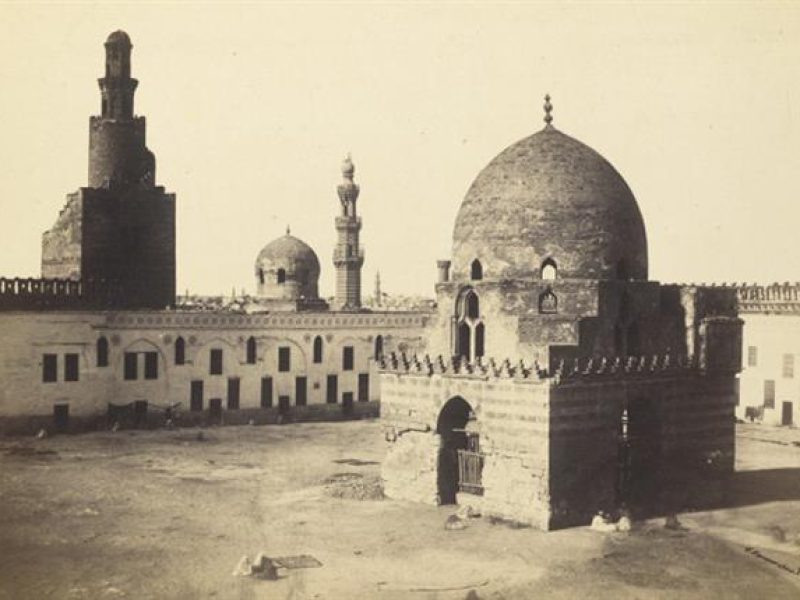The Tulunids
Egypt by the Byzantine Emperor Heraclius, sued for peace, but was accused of treason by the emperor. However, the latter died six months later, and Babylon capitulated in April 641. Alexandria was cAmr’s next goal and, although a much more difficult objective, by September 642 it was his by treaty. The invaders were welcomed by the Copts who were reconciled to the Arabs as they had rid them of the Greek Melkites and allowed them to reinstate their own Patriarch, Benjamin. As in other territories conquered by the Arabs, they did not choose the existing capital as their own, but on the orders of the Khalil CUmar built a town beside the fortress Babylon, a loose agglomeration of dwellings called Fus~t (The Encampment).
It was from here that Egypt was administered as an occupied province of the Khalifate, first for the khalifs in Medina, then the Ummayyads in Damascus and, after a violent transfer of dynasty in 750, the cAbbasids in Baghdad. During this period there were about eighty governors but only two khalifs ever.
visited Egypt in person. Marwan II, the last Ummayyad, fled there during the cAbbasid conquest of Damascus but was caught and murderec;l in 752, while the Khalif Macmiin, son of Hariin al-Rashid, went to Egypt in 832 to suppress a revolt of Copts in ·the Delta, During his brief stay in Egypt he tried to force an entry into one of the pyramids.

The Tulunids
Egypt provided the lands of the Khalifate with food and considerable revenue, as it had done .. other empires before. Slowly there was an· arabisation of the native population. Islam, the religion of the occupying army, was gradually accepted by many of the Coptic population and Arabic increased as the popular language. At the same time the invaders were exposed to many modifying influences, not least of which was the four thousand years of civilisation to which the Egyptians were heii. But inevitably, as the strength of the Khalifate declined, rent by dynastic squabbles, the administration of Egypt slowly disintegrated, taxes became intolerable and prices rose. In 868 the Khalif al-Mu~azz chose a governor for Egypt and the latter sent his
newphew, AJ:imad ibn Till.iin, there to direct his administration for him. The Tiiliinids (86~905). Alµnad ibn Till.fin governed at first from Fustat and, over several years, gradually extended his administrative and territorial power. He constructed a new town, al-Qa~,.(The Concessions), to the NW of Fustat and built up a great army of sla\’es.
The Tulunids
His eventual influence w_:as such that he was able to interfere in a struggle between two contenders for the Khalifate. By the time he died he was in control of much of Syria and independent of Baghdad. He had restored economic stability to Egypt and, although ·the Khalifate retaliated, the system he instituted outlived him and such was the power of his son and successor, Khumarawayh (884), that he was able to dictate terms to the kh.alif delineating his own territory. Although a capable man, he was a spendthrift, the economy decayed and in 896 he was murdered by his slaves. He was succeeded by his two young sons.
The Tulunids
The first, Jaysh, alienated the troops and was himself murdered afternine months; the second, Harlin, although managing to govern for nine years, was unable to halt the economic decline and he was9 also mysteriously murdered in 904. The cAbbasid forces invaded in 905 and, although Harlin’s uncle, Shayban, tried to rally support, he was captured and sent to Baghdad in chains.
The Tulunids
A new governor was chosen by the kh.alif and for the next thirty years Egypt was under direct control of the central government in Baghdad, ruled by a series of military leaders. However, the rule was ppressive and taxation high, the usual signs of ineffectual adminis tration. The Byzantines were again attempting invasion on the N coast and a new power in the W, the Fatimids, had made several efforts at conquest. At this point the khalif al-Rac;li, looking for a strong self-reliant province of Egypt, appointed MuJ;tammad ibn Tughj as governor in 935.




Comment (0)